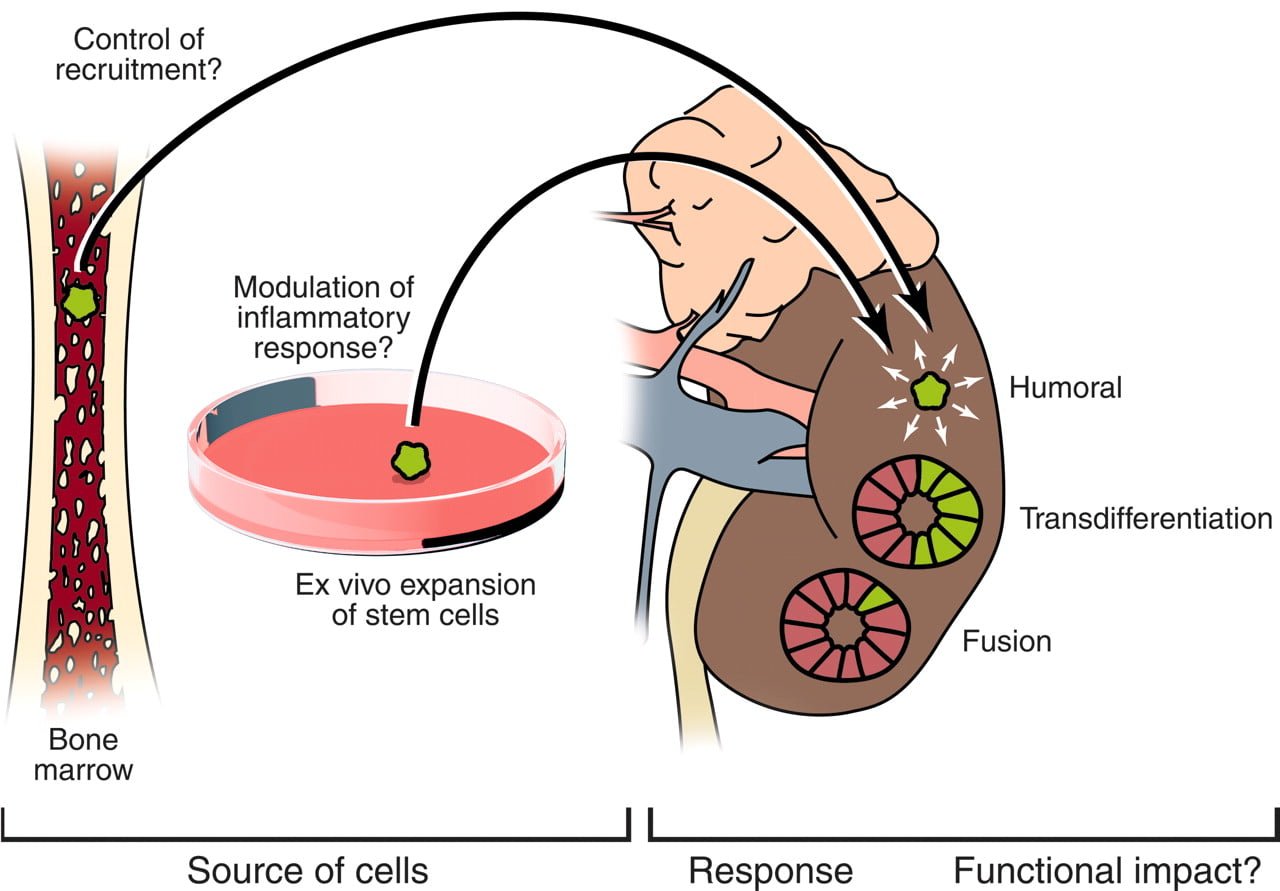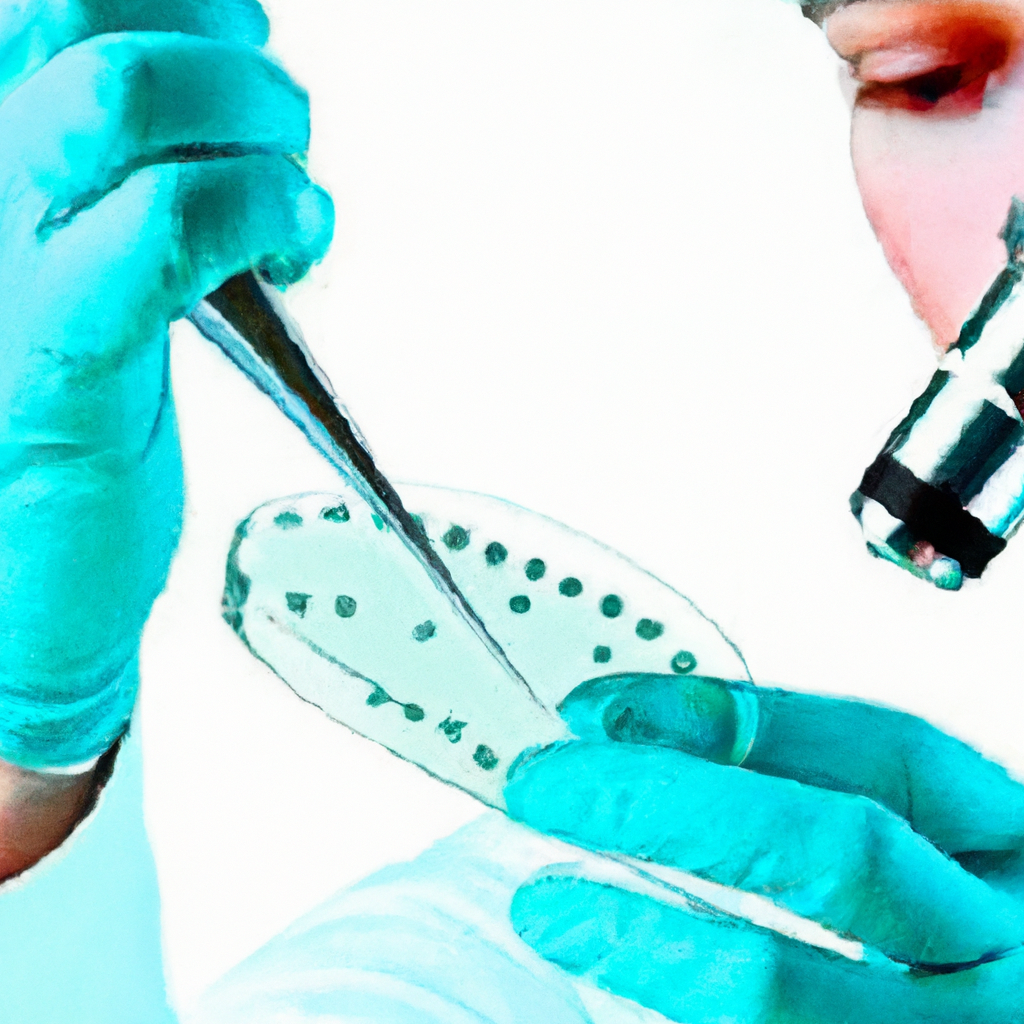Did you know that stem cell therapy holds immense potential in addressing kidney diseases in Malaysia? Stem cells have the remarkable ability to differentiate into various cell types, including kidney cells, which makes them a promising candidate for treating kidney diseases. In this article, we will explore how stem cell therapy can potentially revolutionize the treatment landscape for kidney diseases in Malaysia. By delving into the latest research and advancements, we aim to provide you with a comprehensive understanding of this exciting field. So, let’s embark on this journey together and discover the possibilities offered by stem cell therapy in Malaysia’s fight against kidney diseases.
Overview of Kidney Diseases in Malaysia
Kidney diseases pose a significant health burden worldwide, including in Malaysia. These conditions affect the proper functioning of the kidneys, impairing their ability to filter waste products and maintain fluid balance in the body. This comprehensive article explores the prevalence, types, and challenges in treating kidney diseases in Malaysia.
Prevalence of Kidney Diseases in Malaysia
Kidney diseases have emerged as a major public health concern in Malaysia, with a significant impact on both the affected individuals and the healthcare system. According to the National Renal Registry, the incidence of end-stage kidney disease (ESKD) has been steadily increasing over the years, reaching an alarming rate. This rise can be attributed to various factors, including the aging population, the increasing prevalence of risk factors such as diabetes and hypertension, and the lack of awareness about kidney health.
Types of Kidney Diseases
There are several types of kidney diseases that affect the Malaysian population. Some common forms include chronic kidney disease (CKD), polycystic kidney disease (PKD), and acute kidney injury (AKI). CKD is a progressive condition characterized by the gradual loss of kidney function, while PKD is a genetic disorder causing the growth of fluid-filled cysts in the kidneys. AKI, on the other hand, is a sudden and severe decline in kidney function that often occurs as a result of an underlying condition or medication.
Challenges in Treating Kidney Diseases
Treating kidney diseases can be challenging due to various factors unique to the Malaysian context. Limited access to healthcare services, especially in rural areas, poses a significant hurdle in early detection and management of kidney diseases. Additionally, the high costs associated with kidney treatments, including dialysis and transplantation, can be a barrier for many patients. Furthermore, the shortage of organ donors and the lengthy waiting times for transplantation aggravate the challenges faced by kidney disease patients.
Understanding Stem Cell Therapy
Definition of Stem Cell Therapy
stem cell therapy is an emerging field in medicine that holds promise for the treatment of various diseases, including kidney diseases. It involves the use of stem cells, which are undifferentiated cells capable of differentiating into specialized cell types, to promote tissue repair and regeneration. Stem cells can be sourced from various tissues, including umbilical cord blood, bone marrow, and adipose tissue, or derived from reprogrammed adult cells.
Mechanism of Action in Treating Diseases
Stem cell therapy operates through several mechanisms to treat diseases. When injected into the body, stem cells can migrate to the damaged tissues and release bioactive factors that stimulate the regeneration and repair of injured cells. These factors include growth factors, cytokines, chemokines, and extracellular vesicles, which exert anti-inflammatory, immunomodulatory, and angiogenic effects. Stem cells can also differentiate into specific cell types, such as kidney cells, to replace the damaged ones.
Types of Stem Cell Therapy
Various types of stem cell therapies are being explored for the treatment of kidney diseases. Autologous stem cell therapy involves using a patient’s own stem cells, harvested from their own body, for treatment. Allogenic stem cell therapy utilizes stem cells from a donor, either related or unrelated to the patient. Additionally, there are ongoing studies on the potential of induced pluripotent stem cells (iPSCs) and mesenchymal stem cells (MSCs) in kidney disease treatment. Each approach has its own advantages and considerations when it comes to safety and efficacy.
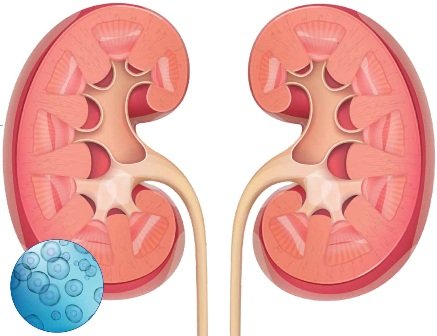
Stem Cell Therapy for Kidney Diseases
Potential of Stem Cell Therapy in Treating Kidney Diseases
Stem cell therapy holds immense potential in addressing the challenges faced in the treatment of kidney diseases. By regenerating and repairing damaged kidney tissues, stem cells have the ability to restore kidney function, potentially reducing the need for dialysis and transplantation. Studies have shown promising results in preclinical and clinical settings, demonstrating the therapeutic potential of stem cell-based interventions in improving kidney function and ameliorating kidney disease progression.
Research and Clinical Trials in Malaysia
Malaysia has been actively involved in research and clinical trials to explore the application of stem cell therapy for kidney diseases. Researchers and medical institutions have conducted studies to evaluate the safety and efficacy of stem cell transplantation in patients with CKD, PKD, and AKI. These studies aim to establish the optimal dosage, timing, and administration route of stem cells, as well as assess the long-term outcomes of the therapy. Such research efforts pave the way for evidence-based treatments and guide medical professionals in implementing stem cell therapy in a regulated manner.
Benefits and Risks of Stem Cell Therapy
The Use of stem cell therapy for kidney diseases offers several potential benefits. It has the potential to regenerate and repair damaged kidney tissues, restore kidney function, and ultimately improve the quality of life for patients. Stem cell therapy may also reduce the need for invasive procedures such as dialysis or kidney transplantation, which can be both costly and have associated complications. However, like any medical intervention, stem cell therapy comes with risks and considerations. These include the potential for immune reactions, tumor formation, and unethical practices if not regulated properly.
Applications of Stem Cell Therapy for Specific Kidney Diseases
Chronic Kidney Disease (CKD)
Chronic kidney disease (CKD) affects a significant portion of the Malaysian population, contributing to the increased burden of kidney diseases. Stem cell therapy holds promise as a potential treatment option for CKD, with the potential to halt the progression of the disease and reduce the need for dialysis or transplantation. Several studies have shown encouraging results, highlighting the potential of stem cells in promoting the repair and regeneration of damaged kidney tissues.
Polycystic Kidney Disease (PKD)
Polycystic kidney disease (PKD) is a genetic disorder characterized by the formation of fluid-filled cysts in the kidneys, leading to kidney enlargement and functional impairment. Stem cell therapy offers potential avenues for the treatment of PKD by targeting the cystic cells and promoting their regeneration. Preclinical studies have shown promising results in reducing cyst size and restoring kidney function, indicating the potential of stem cell therapy as a future treatment option for PKD.
Acute Kidney Injury (AKI)
Acute kidney injury (AKI) is a sudden and severe decline in kidney function that can occur as a result of various factors, such as dehydration, drug toxicity, or underlying medical conditions. Stem cell therapy has been explored as a potential therapeutic approach for AKI, aiming to accelerate kidney repair and regeneration. Studies have demonstrated the ability of stem cells to enhance kidney function recovery and reduce tissue damage, highlighting the potential of this therapy in the management of AKI.
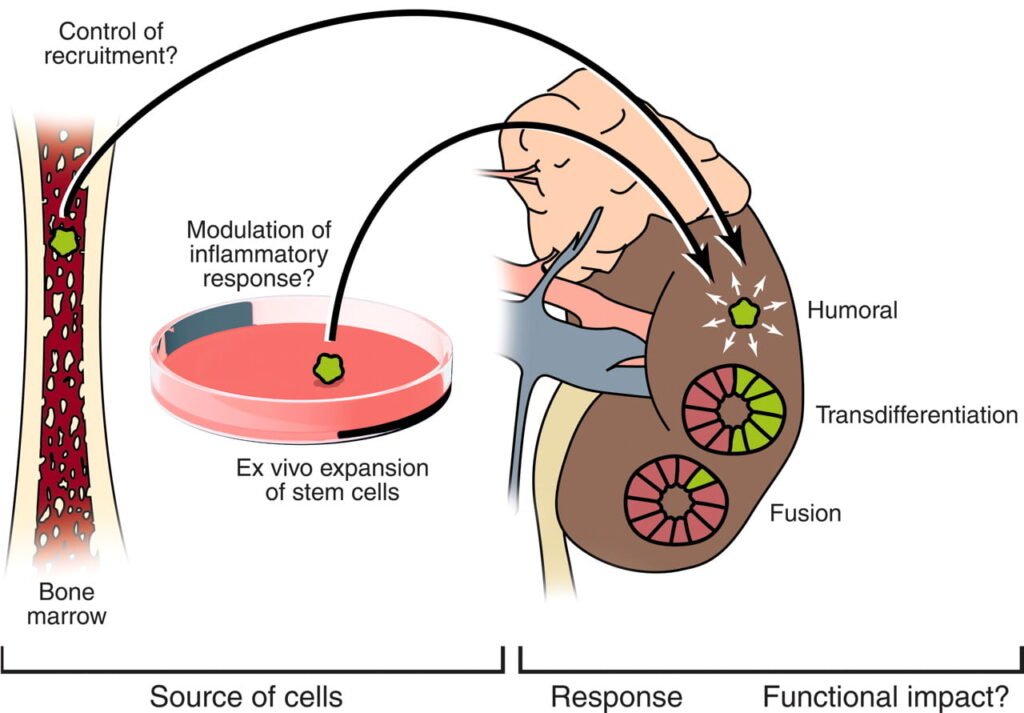
Regulatory Considerations and Challenges in Implementing Stem Cell Therapy
Regulatory Framework in Malaysia
The implementation of stem cell therapy in Malaysia is governed by a regulatory framework to ensure patient safety and ethical practices. The National Pharmaceutical Regulatory Agency (NPRA) oversees the approval and regulation of stem cell products and clinical trials. Stem cell therapies must comply with the guidelines and regulations set forth by the Malaysian government to ensure their safety, efficacy, and quality. The regulatory framework aims to strike a balance between promoting innovation and protecting patient welfare.
Ethical and Safety Concerns
The use of stem cell therapy raises ethical concerns, such as the fair and equitable distribution of resources and access to treatment. Additionally, the safety of stem cell therapy is a crucial consideration. Ensuring that stem cells are sourced from reliable and ethical sources, and that rigorous quality control measures are in place, is essential to minimize potential risks. Ethical oversight committees and regulatory bodies play a crucial role in addressing these concerns and ensuring that stem cell therapies are implemented responsibly.
Limited Access and High Costs
Despite the potential benefits of stem cell therapy, limited access to treatment remains a challenge in Malaysia. The availability of stem cell therapy is often concentrated in urban areas, making it difficult for patients in rural or remote regions to access these advanced treatments. Moreover, stem cell therapy can be expensive, posing financial barriers for many individuals. Addressing the issues of limited access and high costs is important to ensure that stem cell therapy becomes accessible to all Malaysians who could benefit from it.
Current Status and Future Prospects
Availability of Stem Cell Therapy in Malaysia
Stem cell therapy is still considered an emerging field, and its availability in Malaysia is limited to specialized medical centers and research institutions. However, efforts are being made to expand access to stem cell therapy across the country. With ongoing research and advancements in stem cell technology, it is expected that the availability of stem cell therapy will increase in the future, potentially benefiting a larger number of kidney disease patients.
Collaborative Efforts in Research and Development
Collaborative efforts between researchers, clinicians, and healthcare institutions play a key role in advancing the field of stem cell therapy for kidney diseases in Malaysia. By pooling resources, expertise, and knowledge, these collaborative initiatives can accelerate research, promote awareness, and establish standardized protocols for the safe and effective use of stem cell therapy. Collaboration also fosters knowledge exchange and paves the way for multidisciplinary approaches in managing kidney diseases.
Potential Breakthroughs and Advancements
The field of stem cell therapy continues to evolve, with ongoing research and advancements driving potential breakthroughs in the treatment of kidney diseases. Regenerative medicine approaches, such as tissue engineering and organoids, hold promise in generating functional kidney tissues for transplantation. Furthermore, advancements in stem cell technology, including the use of gene editing tools such as CRISPR-Cas9, open up possibilities for targeted interventions and personalized therapies. These breakthroughs have the potential to revolutionize the treatment landscape for kidney diseases in Malaysia and beyond.
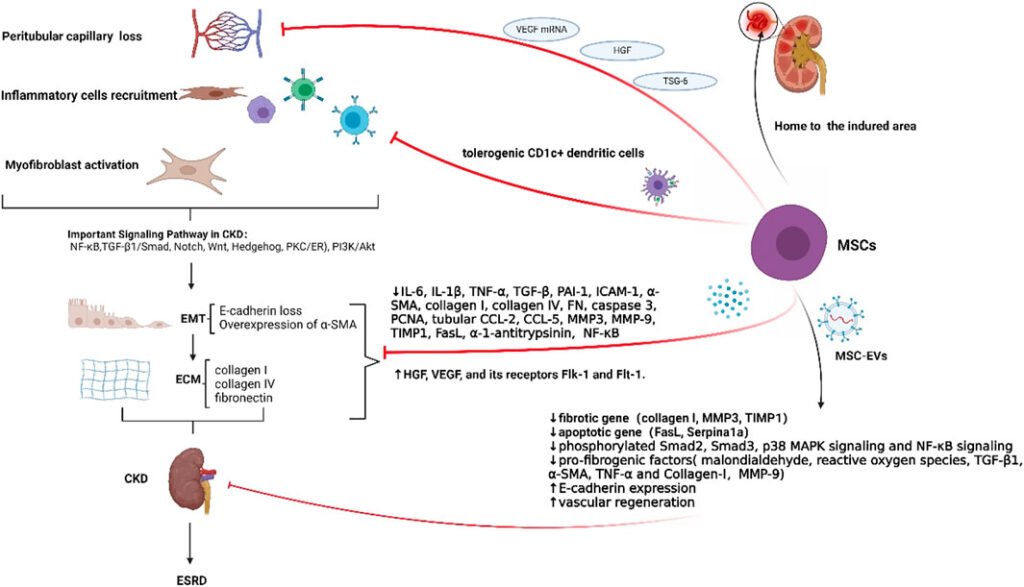
Patient Perspectives and Success Stories
Patient Testimonials
The experiences and perspectives of patients who have undergone stem cell therapy for kidney diseases can provide valuable insights into the potential benefits and outcomes of the treatment. Patient testimonials can shed light on the improvements in their quality of life, the reduction in symptoms, and the overall satisfaction with the therapy. Hearing directly from patients who have had positive experiences with stem cell therapy can inspire hope and encourage others to explore this treatment option.
Case Studies
Case studies offer a detailed analysis of individual patients who have undergone stem cell therapy for kidney diseases. These studies provide comprehensive information about the patient’s condition, treatment protocol, and clinical outcomes. They enable healthcare professionals and researchers to gain a deeper understanding of the efficacy and safety of stem cell therapy in specific cases. Case studies can serve as valuable evidence to support the integration of stem cell therapy into standard treatment protocols for kidney diseases.
Outcomes and Quality of Life
Assessing the long-term outcomes and quality of life improvements in patients who have received stem cell therapy for kidney diseases is crucial in determining the overall effectiveness of the treatment. Studies that evaluate factors such as kidney function, symptom control, medication requirements, and overall patient well-being contribute to the growing body of evidence supporting the use of stem cell therapy. Understanding the impact of stem cell therapy on the lives of patients provides valuable insights for clinicians, researchers, and policymakers.
Conclusion
In conclusion, stem cell therapy offers a promising avenue for the treatment of kidney diseases in Malaysia. With its potential to regenerate and repair damaged kidney tissues, stem cell therapy holds the key to improving the lives of patients affected by conditions such as CKD, PKD, and AKI. Ongoing research, clinical trials, and collaborative efforts are paving the way for the safe and effective implementation of stem cell therapy in Malaysia. With continued advancements and breakthroughs, the future prospects for stem cell therapy in kidney diseases are exciting and full of potential. By exploring innovative treatments like stem cell therapy, Malaysia can significantly impact the management and outcomes of kidney diseases, improving the lives of countless individuals.


